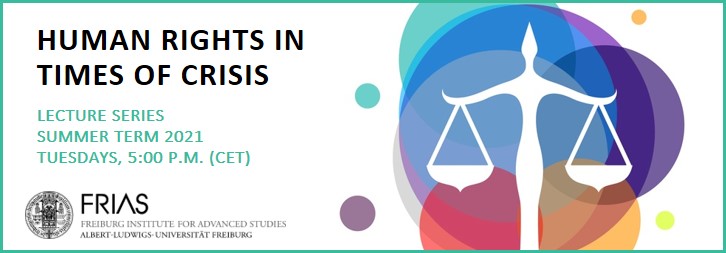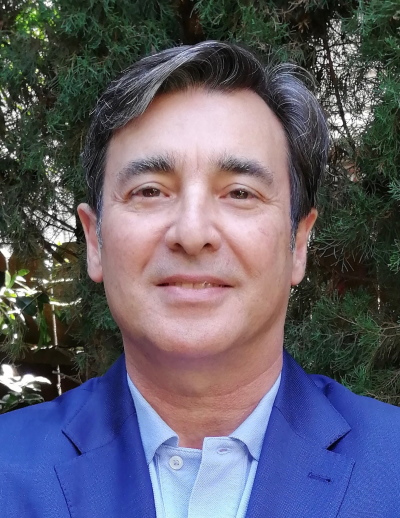Lecture Series "Human Rights in Times of Crisis"
FRIAS Lecture Series im Sommersemester 2021
organisiert durch Silja Voeneky und Bernd Kortmann
Human Rights in Times of Crisis
Am 4. Mai – im Anschluss an den internationalen Tag der Pressefreiheit – beginnt die öffentliche, digitale Vortragsreihe „Human Rights in Times of Crisis” des Freiburg Institute for Advanced Studies (FRIAS). Die FRIAS Lectures bauen thematisch auf der Eröffnungstagung des Connecticut/Baden-Württemberg Human Rights Research Consortium auf, dessen Koordinierung auf deutscher Seite am FRIAS liegt. In acht Veranstaltungen betrachten Expertinnen und Experten unterschiedliche Bereiche der Menschenrechtsforschung. Sie diskutieren Gegenwartsfragen zur Religions-, Meinungs- und Wissenschaftsfreiheit, besprechen Probleme der gerechten Datenkontrolle und -distribution und die Situation der Menschenrechte in verschiedenen Staaten. Zu den Vortragenden gehören Lehrende aus den Bereichen der Rechtswissenschaft, Philosophie und Soziologie.
„Die Vortragsreihe soll untersuchen, welche Bedeutung Menschenrechte, gerade auch die rechtlich verankerten, heute in Staaten und in den verschiedenen Bereichen unseres Lebens besitzen. Dabei wird zentral die Frage erörtert werden, ob diese als universelle Rechte ein stabilisierender Faktor in unsicheren Zeiten und über Staatsgrenzen hinweg sein können. Ich freue mich sehr, dass wir die Gelegenheit haben, dies mit so spannenden Sprecherinnen und Sprecher zu diskutieren, die ihren besonderen Blickwinkel und ihre Forschungen mit uns teilen“, sagt Silja Vöneky, Professorin für Völkerrecht an der juristischen Fakultät der Universität Freiburg und FRIAS-Fellow, welche die Vortragsreihe gemeinsam mit FRIAS-Direktor Prof. Bernd Kortmann ins Leben gerufen hat.
„Das Thema Menschenrechte, und wie sie in Zeiten multipler politischer und gesellschaftlicher Krisen in verschiedenen Teilen der Welt aktuell unter Druck stehen, schließt unmittelbar an verschiedene am FRIAS verhandelte Forschungsprojekte und Initiativen der Universität Freiburg zum Schutz verfolgter Wissenschaftlerinnen und Wissenschaftler an. Als internationales und interdisziplinäres Forschungskolleg der Universität Freiburg freuen wir uns auf spannende Vorträge in dieser transatlantischen Vortragsreihe, die in der Tradition der FRIAS Lunch Lectures steht. Wir freuen uns auf ein möglichst breites Interesse und angeregte Diskussionen mit einem engagierten universitären wie außeruniversitären Publikum,“ sagt FRIAS-Direktor Bernd Kortmann.
Limitations on freedom of expression have become a recurrent issue in contemporary times, especially considering how easy it is to spread offensive opinions against people, ideas or institutions via the Internet or social networks. Many important questions arise in this area, beginning with the responsibility of social networks managers or owners to filter and control the information they allow to be published. The focus of this lecture will be on a specific question: the relations between freedom of expression and freedom of religion, which has a double dimension. On the one hand, the acceptable limitations on offensive anti-religious speech. And on the other hand, the freedom of speech of religious leaders, when they touch on sensitive moral issues and their language can be perceived by some people as offending their dignity. Taking the case law of the European Court of Human Rights as a point of departure, especial attention will be paid to two issues: the need to distinguish what is legally illegitimate from what is socially or morally unacceptable, and to what extent anti-religious offenses are treated by the law according to the same standards as other types of offensive language.
Human Rights in Sudan: Before and after the Revolution, May 11 2021
Rüdiger Wolfrum (Max Planck Institute Heidelberg)
The Constitution of 2005 of the Sudan contained a comprehensive Bill of Rights which even elevated international human rights to the constitutional level. Nevertheless, the human rights record of the Sudan was deplorable. This constitution was abolished after the ousting of President al-Bashir in 2019. The new Interim Constitution contains exactly the same Bill of Rights and the situation is changing in particular in respect of the rights of women. What makes the difference?
 Pandemic Inequalities – What Covid 19 has revealed about Global Health and Human Rights, May 25 2021
Pandemic Inequalities – What Covid 19 has revealed about Global Health and Human Rights, May 25 2021
Alicia Ely Yamin (Harvard Law School Cambridge)
Before the pandemic, we already lived in a context of growing distrust of democratic institutions and multilateralism, impending climate cataclysm, and mass migration and displacement. We already faced the consequences for health and human dignity of hyper-globalization and hyper-concentration of private wealth, and the ensuing ravaging inequalities within and between nations, together with toxic synergies between ethno-nationalism, racism, and misogyny. COVID-19 has the potential to significantly exacerbate the underlying drivers of health and other rights violations enormously, both within and between countries. Nevertheless, this pandemic and the radical upheaval it represents provide an opportunity, and an urgent imperative, to reflect on the profound structural injustices in the world we inhabited pre-pandemic, and on the directions for human rights praxis in health in a post-pandemic future.
Here, I argue the key to discerning future directions is understanding the duality of the historical narrative of applying human rights in global health. That is, just as health-related and other social rights were being articulated, increasingly intrusive global economic governance, often in synergy with anti-democratic centralization of power at national levels, was limiting the political possibilities to realize them.
As the possibilities for progressive intentional transformation through politics became ever smaller over these decades, national politics become increasingly stagnant and performative. In turn, these developments fueled a self-fulfilling narrative of the need for the private sector, and for market-based solutions to social problems. But this sweeping crisis, and the economic and social dislocation it has wrought, provide a window for pushing through significantly more progressive social agendas at the national level in many countries—and substantial reimagination of global economic governance.
 Saving the Public Square: Democratic Principles for a Social Media Age June 1 2021
Saving the Public Square: Democratic Principles for a Social Media Age June 1 2021
Prof. Molly Land (University of Connecticut)
The problems that social media presents for democratic culture seem insurmountable. The varied impacts of the content shared on social media, combined with the dissemination of this content at scale, present unique and conflicting regulatory challenges. However, there are two dimensions of the current social media ecosystem that deserve particular attention—the commercialization of the infrastructure of public discourse, and the misuse of platforms by states and other political elites to suppress dissent and undermine civil society. These two elements of our digital ecosystem have the power to demolish whatever might be left of our commitment to “the public square.” This talk will explore these twin phenomenon of commercialization and digital authoritarianism and argue for a principled approach to state regulation that promotes greater democratic deliberation online.
 Protecting Human Rights from Exclusionary Populism After Trump, June 8 2021
Protecting Human Rights from Exclusionary Populism After Trump, June 8 2021
Prof. Gerald L. Neuman (Harvard University Cambridge)
Exclusionary populism threatens the human rights of the excluded, but also poses danger for the majority and undermines the international human rights regime, especially as populists gain power in countries that were key supporters. Human rights tribunals and rights-respecting governments – which now include the United States – need to respond to these dangers, by focusing not on populism as such, but on specific violations that populism leads to, and on those violations that have contributed to the rise of populism.
 Is Academic Freedom at Risk? A neglected human rights concern for all of us, June 22 2021
Is Academic Freedom at Risk? A neglected human rights concern for all of us, June 22 2021
Ass.Prof. Ercüment Celik (Albert-Ludwigs-Universität Freiburg)
There is a rising tendency to undermine, restrict or suppress academic freedom around the globe. This lecture will offer an overview to the principles and dimensions of academic freedom, and discuss why it has been a neglected human rights concern for all of us. The global attempts to respond to the challenges emerging from the erosion of academic freedom will also be reflected from a historical and contemporary perspective.
 Human Rights, Surveillance, and Epistemic Chaos, July 6 2021
Human Rights, Surveillance, and Epistemic Chaos, July 6 2021
Prof. Mathias Risse (Harvard Kennedy School Cambridge)
Over the last 15 years, large-scale collection of data has become essential to the operations of both the private sector and governments. Electronic devices that we use all day long generate data about what we do. In the aggregate they enable companies and governments to shape behavior. In particular cases these data allow for the minute tracing of individual movements. Powerful entities also control access and dissemination of information, and these entities prominently include platforms like Google, Twitter and Facebook. In the United States these developments have created a situation one could aptly describe as epistemic chaos. This talk explores some of these trends.




